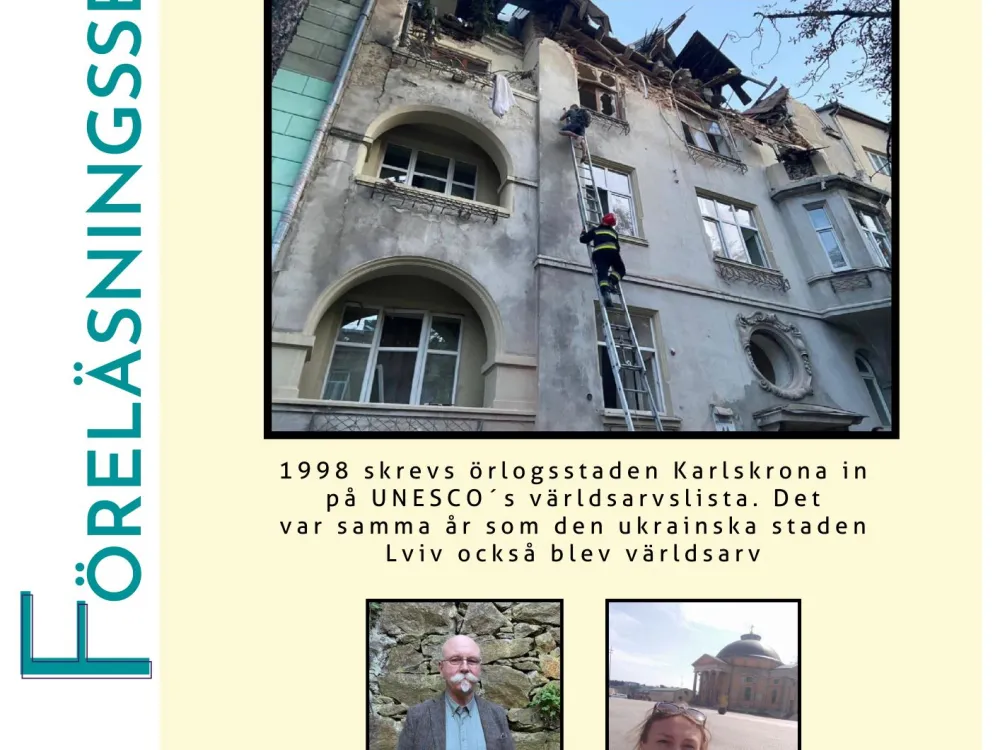
Lviv
- a world heritage city under pressure
Welcome to the lecture Lviv - a World Heritage City on Thursday 24 April at 14.30 in Aula Litorina, Litorina Folk High School, Gullberna Park.
Michael Helgesson from Kulturkompaniet AB and Ukrainian architect Oksana Salivon will give their view of the UNESCO World Heritage City - Lviv - in western Ukraine past and present.
In 1998, both Karlskrona and Lviv were inscribed on the UNESCO World Heritage List. Since then, the UNESCO World Heritage Committee has put Lviv's exceptionally interesting, well-preserved, unified historic centre on the UNESCO World Heritage List in danger due to the Russian offensive war threat (September 2023).
Can Karlskrona as a World Heritage city on the other side of the Baltic Sea play a role for Lviv in this threat situation is perhaps a question that can be asked in this context. We can expect to hear more about the exciting city of Lviv as well as about this possible imminent threat and its possible consequences for the World Heritage site.
Background:
The city of Lviv is located at the foot of the Carpathian Mountains, about 80 kilometres from the Polish border, with 720,000 inhabitants (2024). The city was founded in the Middle Ages and has exceptionally well-preserved Renaissance buildings. Lviv, or Lemberg as it was called in Swedish, has belonged to a series of rulers over the centuries, in chronological order: the Kievan Empire, the Kingdom of Galicia-Volynia, the Kingdom of Poland, Poland-Lithuania, the Habsburg Monarchy, the Empire of Austria, Austria-Hungary, the People's Republic of Western Ukraine, Poland, the Soviet Union and today Ukraine.
Lviv has always been a metropolis and a melting pot of different cultures with the languages Ukrainian, Polish, German, Yiddish, Latin, French, Spanish and Russian. Lviv differs from other cities in the neighbourhood of the Central European profile, which is due to the fact that Lviv was, for a long period, an important Polish cultural city. The redrawing of borders around the Second World War helped to change the life and cultural character of the city, as did the ethnic cleansing ordered by Stalin of Poles from Lviv, Ukrainians to the new Lviv and Germans from Breslau.
Age limit 18 years
Free admission
Michael Helgesson from Kulturkompaniet AB and Ukrainian architect Oksana Salivon will give their view of the UNESCO World Heritage City - Lviv - in western Ukraine past and present.
In 1998, both Karlskrona and Lviv were inscribed on the UNESCO World Heritage List. Since then, the UNESCO World Heritage Committee has put Lviv's exceptionally interesting, well-preserved, unified historic centre on the UNESCO World Heritage List in danger due to the Russian offensive war threat (September 2023).
Can Karlskrona as a World Heritage city on the other side of the Baltic Sea play a role for Lviv in this threat situation is perhaps a question that can be asked in this context. We can expect to hear more about the exciting city of Lviv as well as about this possible imminent threat and its possible consequences for the World Heritage site.
Background:
The city of Lviv is located at the foot of the Carpathian Mountains, about 80 kilometres from the Polish border, with 720,000 inhabitants (2024). The city was founded in the Middle Ages and has exceptionally well-preserved Renaissance buildings. Lviv, or Lemberg as it was called in Swedish, has belonged to a series of rulers over the centuries, in chronological order: the Kievan Empire, the Kingdom of Galicia-Volynia, the Kingdom of Poland, Poland-Lithuania, the Habsburg Monarchy, the Empire of Austria, Austria-Hungary, the People's Republic of Western Ukraine, Poland, the Soviet Union and today Ukraine.
Lviv has always been a metropolis and a melting pot of different cultures with the languages Ukrainian, Polish, German, Yiddish, Latin, French, Spanish and Russian. Lviv differs from other cities in the neighbourhood of the Central European profile, which is due to the fact that Lviv was, for a long period, an important Polish cultural city. The redrawing of borders around the Second World War helped to change the life and cultural character of the city, as did the ethnic cleansing ordered by Stalin of Poles from Lviv, Ukrainians to the new Lviv and Germans from Breslau.
Age limit 18 years
Free admission
Information
- E-mail lotta.stubb@litorina.fhsk.se
